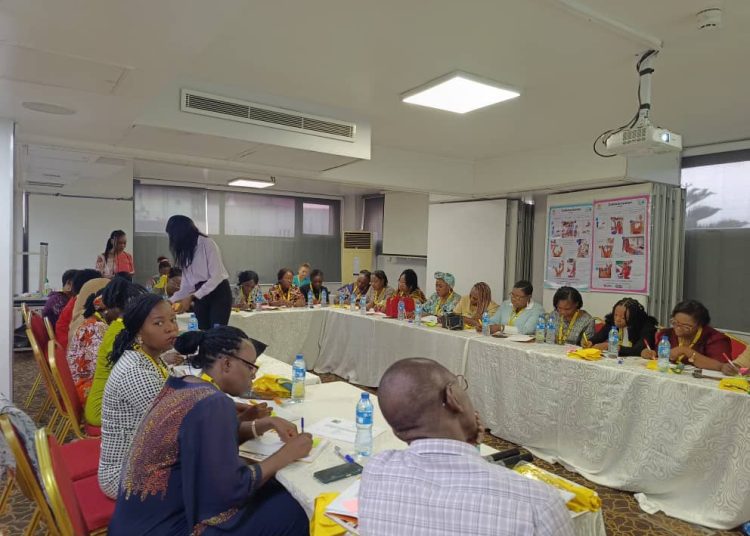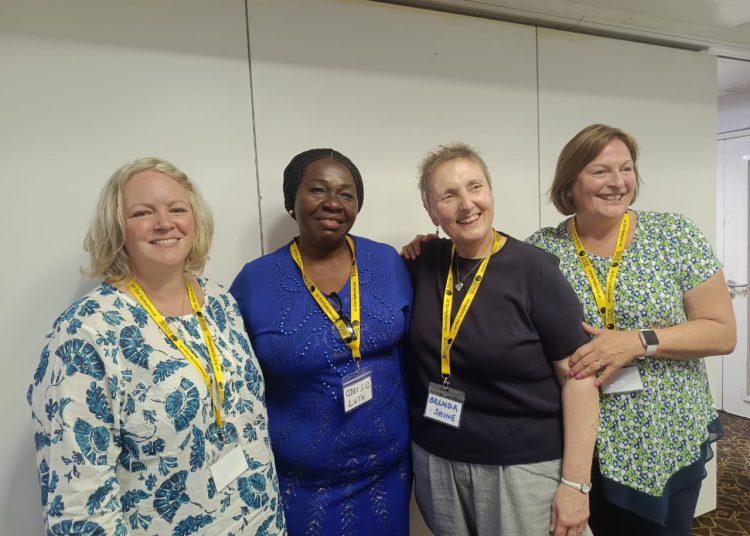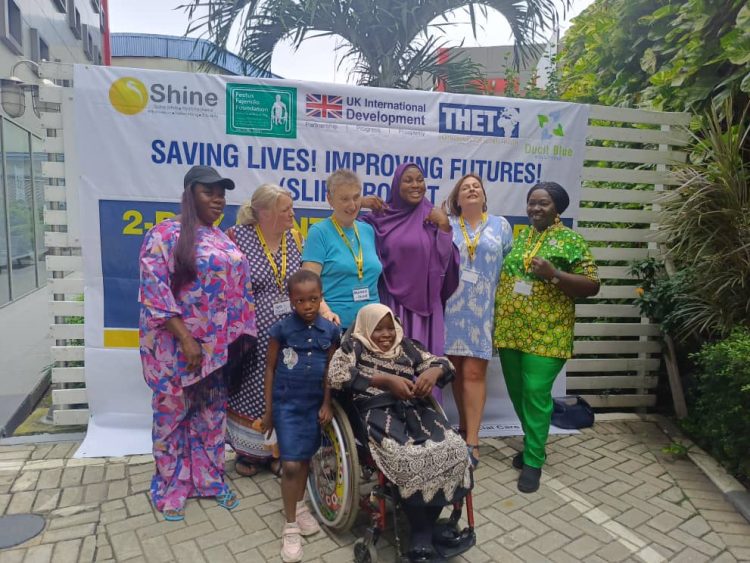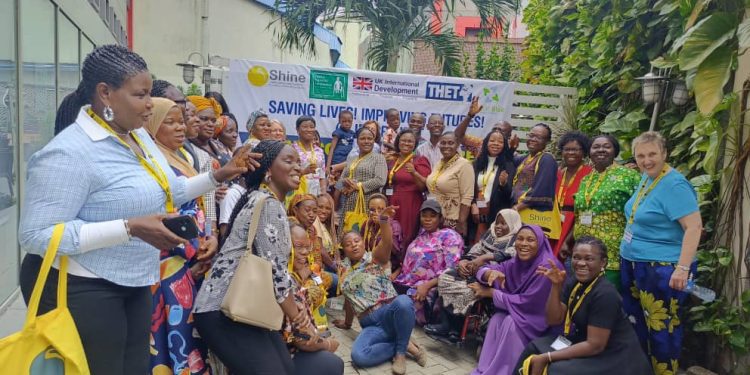Towards enhancing the quality of life and dignity for persons with Spina Bifida and hydrocephalus, Festus Fajemilo Foundation (FFF), Nigeria’s pioneer non-profit organization established to provide succour for persons/families affected by spina bifida and hydrocephalus, has trained 25 health professionals and community outreach workers in 8 Public Health Facilities across 5 regions of the country on Continence care and management.
The two-day training which held in Lagos in partnership with Shine Charity, a national charity organization dedicated to making a positive difference to the lives of people affected by spina bifida and/or hydrocephalus in the UK, was supported by the UK Department of Health and Social Care and managed by The Tropical Health & Education Trust and Ducit Blue Solutions
Facilitated by experts from the UK and Nigeria, the capacity-building has an overarching goal “to build and strengthen the skills, knowledge, and capacity of healthcare professionals in Nigeria to improve the life chances and future of babies, children, and young adults with spina bifida.”

The Continence Care Project
The continence management project is an intervention implemented by FFF since 2017in partnership with Shine Charity, which helps to address the incontinence challenges that persons with spina bifida go through.
To manage this challenge, FFF has over the years engaged in different interventions which include Clean Intermittent Catheterisation (CIC), bowel washouts (BWO), measuring bladder pressure and instillation of oxybutynin a medication that is used INTRAVESICAL to reduce muscle spasms of the bladder and urinary tract
FFF trains nurses in public health facilities to support families who have children with spina bifida, to ensure they live a life of dignity.
The organization also has a group of outreach workers who are linked to specific hospitals and help to provide families with adequate information and support about spina bifida and hydrocephalus, and the interventions they can access.
Afolabi Fajemilo, the Director and Co-founder of FFF in an interview with BONews explained that “Persons with spina bifida usually experience difficulty in controlling the movements of their bowels and bladder because of a neuropathic (nerve-damaged) bladder and bowel.
“With no continence intervention, a significant proportion of children with spina bifida will experience kidney problems, which without treatment would result in renal failure.” They will also experience social issues such as isolation, low self-esteem and possible psychological problem that may negatively impact their mental health.
Kate Steele, the CEO of Shine UK also shared, that persons with spina bifida will experience pain in their bladder and bowels, reduced/altered feeling in the lower body, anxiety, depression, and low self-esteem, among others.
She also noted that lack of continence management can lead to overactive bladder muscle, storing urine at high pressures, which may harmfully impact the lives of persons with spina bifida.
The Training
The two-day training sessions were facilitated by continence experts from the UK which include Kate Steele, the CEO of Shine UK; Kate Bourdeaux, and Brenda Cheer; Mrs Ojei from Lagos University Teaching Hospital (LUTH) and Afolabi Fajemilo, the Director and Co-founder of FFF.

The sessions captured theoretical and practical sessions on continence care and experience sharing among the outreach workers.
Speaking about the impact of the training, Omowumi Mary Folaranmi, an outreach worker attached to the Lagos State University Teaching Hospital (LUTH), shared that the training has been insightful and helped to have an in-depth understanding of her role.
While speaking about the challenges she experienced in the course of her work, Folaranmi said “one of the goals of this project is to enhance independent living for children with spina bifida. But there are instances where some of the beneficiaries have multiple disabilities, and the parent cannot communicate or demonstrate the procedure of clean intermittent catheterization to them.”
She however noted that she would continue to provide the necessary support to individuals and families, as she has been adequately equipped by FFF and Shine, through the two-day training.
Folaranmi commended FFF for the training as it would benefit her, and other health workers significantly and most importantly benefit persons with spina bifida across the country.
Peace Odinakachi Edward, an outreach worker attached to the University of Benin Teaching Hospital (UBTH), shared that like other outreach workers, her role is to act as a liaison officer between families of persons with spina bifida and the hospitals.
Edward commended FFF for the interventions so far and the training, which according to her has been impactful, insightful and with a lot of things to learn.
She said “this is my first time doing the face-to-face training because we usually have periodic virtual training sessions. However, this has been engaging and I have been able to widen my horizon on continence management.”
Speaking on some of the challenges that she experiences as an outreach worker, Edward shared that some parents live in denial and do not want to accept the health status of their children, considering that it is a life-long defect and this limits her from performing her duties effectively.
She, however, noted that through the training, she has learnt different strategies that would help her to have meaningful engagement with parents, teachers and persons with spina bifida themselves.
“Some of the tools that have been shared here will also be useful in doing my work back in Benin -City and environs,” she added.
Deborah Digbani, a paediatric nurse from Rivers State University Teaching Hospital (RSUTH), shared that before FFF engaged with the hospital, children born with spina bifida were usually referred to other hospitals outside the state because of the lack of capacity to care for them.
She, however, noted that since FFF started training nurses and implementing interventions within the hospital, a lot of nurses are empowered about how best to care for persons with spina bifida.
Digbani appreciated FFF for the continuous training and said she’s more equipped to educate parents and caregivers on how to care for their children with spina bifida.
Beyond the training and expanding the care
Fajemilo, who explained that the Continence Management project has been ongoing since 2017, noted that the project has impacted over 155 beneficiaries across the country
He explained the 8 public health facilities where the project is being implemented which included- Lagos University Teaching Hospital (LUTH), University College Hospital (UCH) Ibadan, Obafemi Awolowo University Teaching Hospital Complex (OAUTHC), University of Benin Teaching Hospital (UBTH), Rivers State University Teaching Hospital (RSUTH), Federal Medical Center Umuhia, Usman Dan Fodio Univesity Teaching Hospital (UDUTH) Sokoto and University of Abuja Teaching Hospital (UATH).
Fajemilo shared that “FFF is supporting the hospitals to have continence care & management as one of the regular hospital services such that children with spina bifida who usually have associated challenges which include leg deformities, poor sensation in their lower limbs and partial or total paralysis of the lower limbs and more devastating, bladder and bowel incontinence, can access quality & holistic health care.”
He disclosed that the project aims to reach about 250 beneficiaries by January 2025. “Directly, we are reaching 10 nurses in each of the facilities and 8 outreach workers at project sites and the FFF clinic. We want to spread more because there are families that are helpless and unable to find the necessary help. We want to get to secondary healthcare facilities as well so that persons with spina bifida can access the quality of care they deserve,” Fajemilo added.
He also noted that the organization has been compiling the data of beneficiaries and those who are yet to benefit from the organization’s intervention to engage policymakers for relevant and appropriate interventions.
He charged the nurses and outreach workers who have been trained to make the best use of what they’ve learnt to the benefit of persons with spina bifida and their families He encouraged some of the trainees to specialize in the field of continence care and management to becoming certified continence specialist nurses.
The FFF ED said “this training has been organized to build the skills, knowledge and capacity of healthcare professionals and outreach workers to be able to deliver qualitative continence care and services across their various facilities. This training is one of the activities under Saving Lives! Improving Futures (SLIF) Project, which is funded by the UK Department of Health and Social Care. So, we expect beneficiaries to make the best use of it to impact the lives of persons with spina bifida around them.”
Kate Steele, Shine’s CEO, who expressed her delight with the level of commitment and dedication exhibited by the health workers, said “I hope they will go away with the things that they have learnt, and impact people around them positively.”


